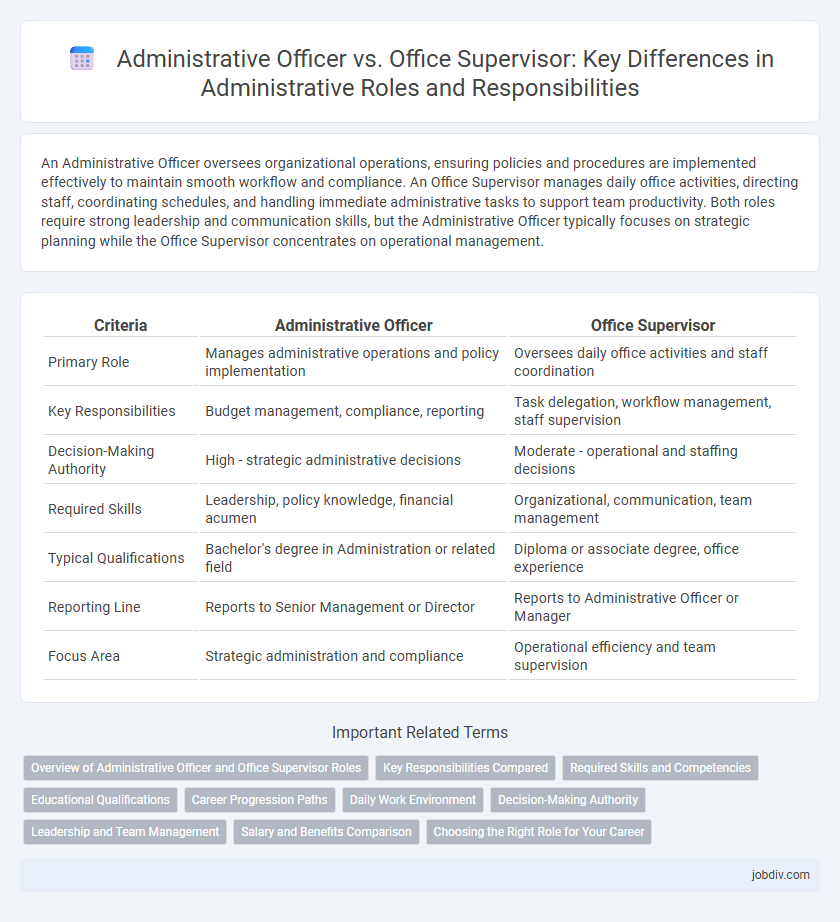An Administrative Officer oversees organizational operations, ensuring policies and procedures are implemented effectively to maintain smooth workflow and compliance. An Office Supervisor manages daily office activities, directing staff, coordinating schedules, and handling immediate administrative tasks to support team productivity. Both roles require strong leadership and communication skills, but the Administrative Officer typically focuses on strategic planning while the Office Supervisor concentrates on operational management.
Table of Comparison
| Criteria | Administrative Officer | Office Supervisor |
|---|---|---|
| Primary Role | Manages administrative operations and policy implementation | Oversees daily office activities and staff coordination |
| Key Responsibilities | Budget management, compliance, reporting | Task delegation, workflow management, staff supervision |
| Decision-Making Authority | High - strategic administrative decisions | Moderate - operational and staffing decisions |
| Required Skills | Leadership, policy knowledge, financial acumen | Organizational, communication, team management |
| Typical Qualifications | Bachelor's degree in Administration or related field | Diploma or associate degree, office experience |
| Reporting Line | Reports to Senior Management or Director | Reports to Administrative Officer or Manager |
| Focus Area | Strategic administration and compliance | Operational efficiency and team supervision |
Overview of Administrative Officer and Office Supervisor Roles
An Administrative Officer manages organizational tasks such as budgeting, policy implementation, and staff coordination to ensure operational efficiency. An Office Supervisor oversees daily office functions, including supervising support staff, managing schedules, and maintaining workplace order. Both roles require leadership and communication skills, with the Administrative Officer focusing on strategic management and the Office Supervisor emphasizing hands-on office operations.
Key Responsibilities Compared
An Administrative Officer typically manages organizational policies, oversees budgeting, and ensures compliance with regulations, while an Office Supervisor focuses on daily office operations, including staff coordination and workflow management. Administrative Officers often handle strategic planning and resource allocation, whereas Office Supervisors emphasize employee supervision and maintaining office efficiency. Both roles require strong leadership and communication skills but differ in scope, with Administrative Officers handling broader administrative functions and Office Supervisors managing specific office activities.
Required Skills and Competencies
Administrative Officers require strong organizational skills, proficiency in office software, and the ability to manage multiple tasks simultaneously. Office Supervisors need leadership competencies, effective communication skills, and experience in coordinating team workflows to ensure operational efficiency. Both roles benefit from problem-solving abilities and attention to detail to support administrative functions.
Educational Qualifications
An Administrative Officer typically requires a bachelor's degree in Business Administration, Public Administration, or a related field, emphasizing strategic management and organizational skills. An Office Supervisor often holds a diploma or associate degree focusing on office management or administrative support, prioritizing practical office operations and team coordination. Higher educational qualifications for Administrative Officers prepare them for policy implementation, while Office Supervisors focus on executing daily office tasks.
Career Progression Paths
Administrative Officers often advance by gaining specialized expertise in policy implementation and project management, positioning themselves for senior management roles within large organizations. Office Supervisors typically progress through enhancing team leadership skills and operational efficiency, which can lead to higher-level positions such as Operations Manager or Administrative Manager. Career growth for both roles depends on acquiring strategic planning abilities and proficiency in organizational development.
Daily Work Environment
An Administrative Officer typically manages organizational policies, coordinates interdepartmental communication, and oversees compliance with regulations in a structured office environment. An Office Supervisor focuses on overseeing daily office operations, managing staff schedules, and ensuring efficient workflow within the immediate workspace. Both roles require strong leadership skills, but the Administrative Officer often handles broader strategic tasks, while the Office Supervisor is more involved in hands-on team management.
Decision-Making Authority
Administrative Officers typically hold broader decision-making authority, managing resource allocation, policy implementation, and strategic planning within the office. Office Supervisors generally have more limited decision-making power, focusing on daily operational oversight, staff coordination, and workflow management. The distinction lies in the scope of decisions, with Administrative Officers influencing organizational direction and Office Supervisors ensuring adherence to established protocols.
Leadership and Team Management
An Administrative Officer typically oversees strategic planning and policy implementation, demonstrating strong leadership in coordinating cross-departmental teams to enhance organizational efficiency. An Office Supervisor focuses more on day-to-day team management, ensuring workflow consistency and resolving operational issues within the office environment. Both roles require excellent communication skills, but the Administrative Officer often handles broader leadership responsibilities with a focus on long-term objectives.
Salary and Benefits Comparison
Administrative Officers generally earn higher salaries than Office Supervisors, with median annual wages around $58,000 compared to $47,000 for Office Supervisors, reflecting broader responsibilities and required qualifications. Benefits for Administrative Officers often include comprehensive health insurance, retirement plans, and performance bonuses, whereas Office Supervisors typically receive standard benefits packages with less emphasis on bonuses. Salary and benefits disparities highlight the difference in leadership scope and administrative duties between the two roles.
Choosing the Right Role for Your Career
An Administrative Officer typically handles broader organizational responsibilities, including policy implementation and resource management, making this role ideal for those seeking strategic leadership opportunities in administration. In contrast, an Office Supervisor focuses on overseeing daily office operations and team coordination, suiting individuals who prefer hands-on management and direct staff supervision. Evaluating your career goals and preferred scope of duties can help determine whether to pursue the comprehensive role of Administrative Officer or the operational focus of Office Supervisor.
Administrative Officer vs Office Supervisor Infographic

 jobdiv.com
jobdiv.com